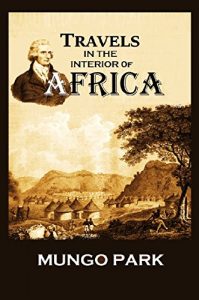Mungo Park (1771 – 1806) was a Scottish naturalist and explorer of the African continent. He was the first Westerner known to have travelled to the central portion of the Niger River.
On 26 September 1794 Mungo Park offered his services to the African Association, then looking for a successor to Major Daniel Houghton, who had been sent in 1790 to discover the course of the Niger River and had died in the Sahara. Supported by Sir Joseph Banks, Park was selected. On 22 May 1795, Park left Portsmouth, England, on the brig Endeavor, a vessel trading to the Gambia for bees wax and ivory.
His book Travels in the Interior Districts of Africa was a success because it detailed what he observed, what he survived, and the people he encountered. His honest descriptions set a standard for future travel writers to follow. This gave Europeans a glimpse of what Africa was really like. Park introduced them to a vast, unexplored continent. After his death public and political interest in Africa began to increase. He had proved that Africa could be explored. Perhaps the most lasting effect of Park's travels, though, was their influence on European governments.
Parks writes:
"My instructions were very plain and concise. I was directed, on my arrival in Africa, “to pass on to the river Niger, either by way of Bambouk, or by such other route as should be found most convenient. That I should ascertain the course, and, if possible, the rise and termination of that river. That I should use my utmost exertions to visit the principal towns or cities in its neighbourhood, particularly Timbuctoo and Houssa; and that I should be afterwards at liberty to return to Europe, either by the way of the Gambia, or by such other route as, under all the then existing circumstances of my situation and prospects, should appear to me to be most advisable.”
This book originally published in 1893 has been reformatted for the Kindle and may contain an occasional defect from the original publication or from the reformatting.
On 26 September 1794 Mungo Park offered his services to the African Association, then looking for a successor to Major Daniel Houghton, who had been sent in 1790 to discover the course of the Niger River and had died in the Sahara. Supported by Sir Joseph Banks, Park was selected. On 22 May 1795, Park left Portsmouth, England, on the brig Endeavor, a vessel trading to the Gambia for bees wax and ivory.
His book Travels in the Interior Districts of Africa was a success because it detailed what he observed, what he survived, and the people he encountered. His honest descriptions set a standard for future travel writers to follow. This gave Europeans a glimpse of what Africa was really like. Park introduced them to a vast, unexplored continent. After his death public and political interest in Africa began to increase. He had proved that Africa could be explored. Perhaps the most lasting effect of Park's travels, though, was their influence on European governments.
Parks writes:
"My instructions were very plain and concise. I was directed, on my arrival in Africa, “to pass on to the river Niger, either by way of Bambouk, or by such other route as should be found most convenient. That I should ascertain the course, and, if possible, the rise and termination of that river. That I should use my utmost exertions to visit the principal towns or cities in its neighbourhood, particularly Timbuctoo and Houssa; and that I should be afterwards at liberty to return to Europe, either by the way of the Gambia, or by such other route as, under all the then existing circumstances of my situation and prospects, should appear to me to be most advisable.”
This book originally published in 1893 has been reformatted for the Kindle and may contain an occasional defect from the original publication or from the reformatting.






